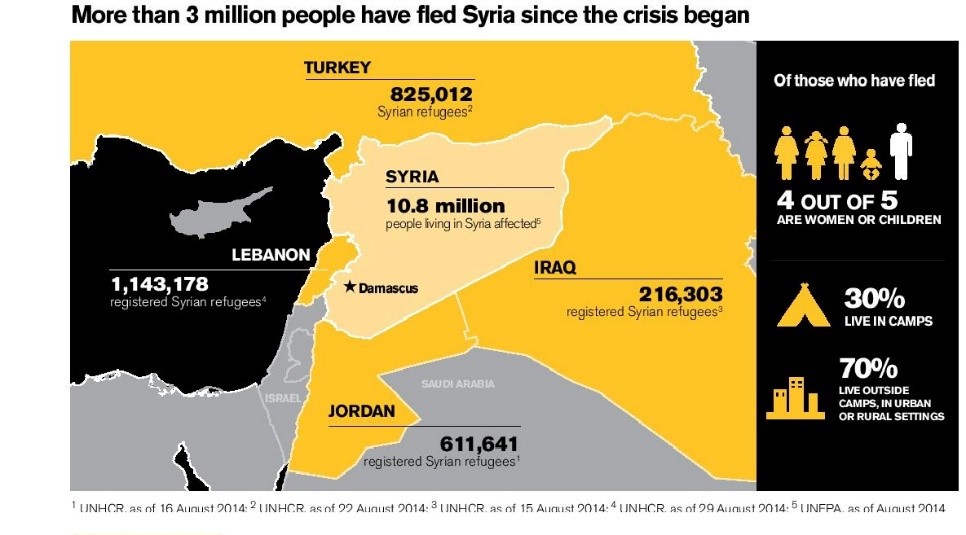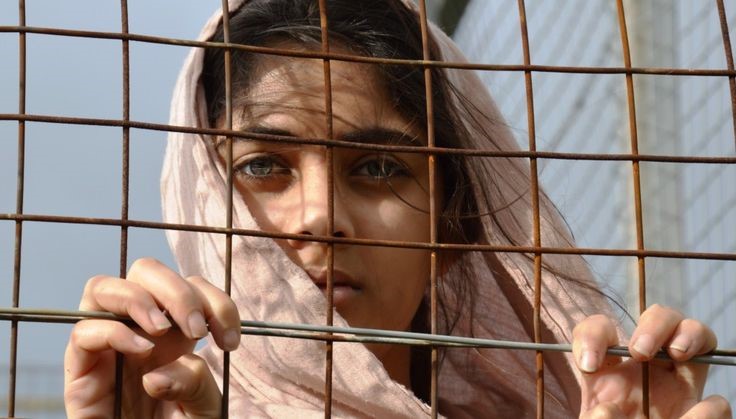PROTECT REFUGEE WOMEN! A Risk Journey From Syria

By Stefania Arru, ProMosaik Italia. Personal safety and protection:
what do they mean for women? And specifically what do they mean for refugee
women?
what do they mean for women? And specifically what do they mean for refugee
women?
Gender-based violence and sexual violence are international
issues already well-known, that nowadays take on a great importance for refugee
women in the Syrian crisis.
issues already well-known, that nowadays take on a great importance for refugee
women in the Syrian crisis.
Since 2011, the Syrian civil war has forced millions of
people to flee from the country to seek safety in Turkey, Iraq, Lebanon, Jordan
and Egypt.
people to flee from the country to seek safety in Turkey, Iraq, Lebanon, Jordan
and Egypt.
The most vulnerable victims of the war are always
women and children and in this crisis they represent the majority of the
refugees.
women and children and in this crisis they represent the majority of the
refugees.
In January 2016, 55% of
refugees were women and children, instead of 27% in June 2015
refugees were women and children, instead of 27% in June 2015
From the native country to the host one, women experience
difficulties not only as women, but also as refugees: being a female refugee
exposes women to extra risks.
difficulties not only as women, but also as refugees: being a female refugee
exposes women to extra risks.

Prior to flight, when conflict emerges, family and community
structures are destroyed and gender roles are changed. Women are more subject
to violence because of frustration and worries which increase negatively the
male power over women, causing numerous episodes of domestic violence; additionally,
during internal crisis women may be left completely alone or with the
responsibility to take over non-traditional roles, such as head of household,
for which women are seldom prepared.
structures are destroyed and gender roles are changed. Women are more subject
to violence because of frustration and worries which increase negatively the
male power over women, causing numerous episodes of domestic violence; additionally,
during internal crisis women may be left completely alone or with the
responsibility to take over non-traditional roles, such as head of household,
for which women are seldom prepared.
These conditions put refugees in serious danger even before
the decision to escape. Policemen, militariy and local individuals may allow unaccompanied
women and female heads to flee or earn money to escape but often demand sexual
favours in return.
the decision to escape. Policemen, militariy and local individuals may allow unaccompanied
women and female heads to flee or earn money to escape but often demand sexual
favours in return.
Additionally during their escape, pirates, bandits, smugglers, border guards,
individuals or other refugees may demand sexual services or, even worse, commit
harassments and rapes. Along the migration route women and girls are often unaware
of their rights and the services available for refuges. Many of them travel without
knowing where they are currently or which cities they should cross. This lack
of information makes women defenceless and vulnerable to the acts of violence.
individuals or other refugees may demand sexual services or, even worse, commit
harassments and rapes. Along the migration route women and girls are often unaware
of their rights and the services available for refuges. Many of them travel without
knowing where they are currently or which cities they should cross. This lack
of information makes women defenceless and vulnerable to the acts of violence.
Similar problems are experienced in refugee camps, where local people and persons
in authority, such as military police and international refugee workers, may
take advantage of refugees’ weak and delicate situations. Exploitation and
extortion are not sporadic episodes in this context and the rate of violence increases
significantly in the shelters where specific services for women are not provided.
in authority, such as military police and international refugee workers, may
take advantage of refugees’ weak and delicate situations. Exploitation and
extortion are not sporadic episodes in this context and the rate of violence increases
significantly in the shelters where specific services for women are not provided.
Many refugee settlements are overcrowded with minimal
privacy and compromised safety, particularly those locate in inhabiting
privacy and compromised safety, particularly those locate in inhabiting
abandoned public buildings. There is an absence not
only of prevention and support services to sexual and gender-based violence,
but also of basic needs: no separate distribution for food, or distinct wash
facilities, or different accommodation for specific groups, including single
women, pregnant women, female-headed households, and for families.
only of prevention and support services to sexual and gender-based violence,
but also of basic needs: no separate distribution for food, or distinct wash
facilities, or different accommodation for specific groups, including single
women, pregnant women, female-headed households, and for families.
Euro Mediterranean Human Rights Network states that 6000
Syrian women have been victims of sexual
assault and rape since the
crisis began.
Syrian women have been victims of sexual
assault and rape since the
crisis began.

In 2005 the United
Nations General Assembly released a comprehensive report (Zeid Report) that
detailed problems with sexual violence in peacekeeping missions, including
those crimes committed in refugee camps. However, in the more than 10 years
since the report, there are still many documented cases of sexual assaults
committed by United Nations personnel against women and children in camps.
These cases highlight the added vulnerability of women and children who are
displaced by war.
Nations General Assembly released a comprehensive report (Zeid Report) that
detailed problems with sexual violence in peacekeeping missions, including
those crimes committed in refugee camps. However, in the more than 10 years
since the report, there are still many documented cases of sexual assaults
committed by United Nations personnel against women and children in camps.
These cases highlight the added vulnerability of women and children who are
displaced by war.
In order to protect themselves from the violence and
to avoid extortion, women or, sometimes the entire family, decide to get
married inside the camps. Among refugees early marriages are considered as a
new strategy of protecting women and of easing pressures on family finances. NGOs
like CARE have reported an increase in the number of child marriages in refugee
camps. This problem contributes negatively to increase the force marriages, and
consequently the women and girls’ repression and early pregnancy. The earlier
girls are married the less likely they are to complete their education and the
more likely they are to endure a life of poverty. CARE run programs in camps to
educate on the dangers of child marriages.
to avoid extortion, women or, sometimes the entire family, decide to get
married inside the camps. Among refugees early marriages are considered as a
new strategy of protecting women and of easing pressures on family finances. NGOs
like CARE have reported an increase in the number of child marriages in refugee
camps. This problem contributes negatively to increase the force marriages, and
consequently the women and girls’ repression and early pregnancy. The earlier
girls are married the less likely they are to complete their education and the
more likely they are to endure a life of poverty. CARE run programs in camps to
educate on the dangers of child marriages.
What can States do to guarantee more protection?
- Governments should ensure minimal safe standards,
clinical care locations, provide experts to help women victims of violence on
psychological and physical level. - Establish confidential and trusted mechanisms for
tracking and reporting incidents of sexual exploitation and abuse during aid
delivery, and inform Syrian women and girls about the existence of such mechanisms. - Allow civil organizations to work and help refugee in
the transit areas. - At the refugee camps provide women simple access to
register, explain refugees’ rights and specific services for them. - Guarantee programs tailored to the specific risks and
needs of adolescent girls should be expanded across the regional response. This
requires multidisciplinary programs ensuring safe spaces, age appropriate
services and life-skills opportunities for adolescent girls. - Offer tracking mechanisms and familiar reunification,
especially to unaccompanied women and girls.


